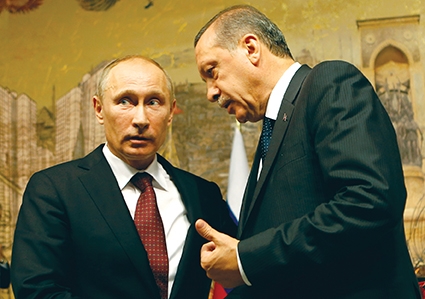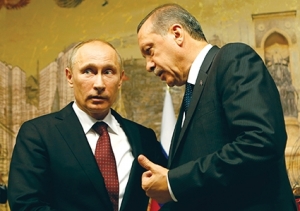Turkey-Georgia-Azerbaijan Axis Will Only Strengthen
OP-ED
Many pundits across our region have begun wondering what impact the recent improvement of relations between Turkey and Russia could have on the South Caucasus, and especially on Georgia. Tbilisi has notoriously bad relations with Moscow, and it is interesting to see how the Russian factor would influence the current state of close relations between Turkey and Georgia and, by extension, Azerbaijan. As I will argue below, despite close Russia-Turkey contacts, Tbilisi and Ankara, along with Baku, will remain committed partners for a number of reasons ranging from economic and military to purely political spheres. It will also be shown that the backbone of this endured partnership will be the Trilateral format together with Azerbaijan.
Indeed, Russian-Turkish relations have improved over the last year and a half. Both countries have shared interests in Syria, and the two have made significant steps forward in energy and economic co-operation. Ankara is currently considering buying a Russian S-400, and have become interested in the future S-500. This all is clear, but it is important to note that this Russian-Turkish improvement of relations will not come at the cost of Turkey sacrificing its co-operation with Georgia and by extension with Azerbaijan.
For instance, Turkey’s President, Recep Tayyip Erdogan, made some interesting remarks about supporting Georgia and Azerbaijan’s territorial integrity at this year’s UN Annual Assembly, and was no less supportive of Ukraine’s state when he recently visited Kiev. Moreover, to underpin all those statements, there is also a clear geopolitical paradigm where Ankara enjoys the trilateral format with Georgia and Azerbaijan.
The format was first introduced in May 2012 in Batumi, and since then the engagement between the three countries has only been increasing. The defense and economic co-operation between the countries increased, and we witnessed numerous joint military exercises between the three armies. Furthermore, the countries also co-operate on the exchange of military staff and military expertise.
The durability of strategic partnership takes precedence as the three countries need each other. Military co-operation, along with railways and pipelines, represents a sticking point for Turkey, Georgia, and Azerbaijan.
Considering how shaky the regional, political and security landscape in the South Caucasus and the Black Sea is, co-operation between the three countries is certainly important. The trilateral alliance is altogether noteworthy as is consists of NATO member Turkey, EU/NATO-oriented Georgia, and Azerbaijan which, up until now, has avoided joining any large economic or military alliances.
However, despite the three countries’ evidently divergent strategic paths, the basis for trilateral co-operation has only increased. Every of the three countries need the others. Turkey wants a more stable Georgia, with deeper economic and energy relations, while Azerbaijan, in the light of uncertainties regarding Nagorno-Karabakh, needs Turkey’s backing. Georgia, in-between, under pressure from Russia and being dependent on transit, in turn, needs both Turkey and Azerbaijan. Moreover, the two countries are Tbilisi’s biggest trade partners and investment sources.
The trilateral co-operation between Turkey, Georgia and Azerbaijan is also based on mutual interests and geopolitical challenges. The countries are less concerned with different religions, foreign policy vectors, etc. All three see how interdependent they are, and there are clear imperatives (internal problems, foreign pressure) to increase the co-operation within this format. In other words, energy and transport infrastructure tying the three states, such as the Baku-Tbilisi-Ceyhan, pipeline takes precedence. Furthermore, the countries are set to unveil later this year the important Baku-Tbilisi-Akhalkalaki-Kars railway which will effectively connect the Caspian and the Black seas and increase regional interconnectivity.
This geopolitical thinking has been central to Turkey-Georgia-Azerbaijan co-operation. True, the countries still lack a common agenda on how to further develop their military co-operation, and there are not yet any concrete mechanisms on how to deal with foreign challenges, but the trilateral format nevertheless has proved to be a long-lasting one.
Thus, despite much-improved Turkey-Russia relations, there are no concrete developments suggesting that this will negatively impact the existing relations between Turkey and Georgia, and the larger Trilateral format discussed above. In fact, what we have recently seen suggests that co-operation between the three countries has only increased, regardless of how volatile the region generally is. This makes it also quite likely that, based on geopolitical imperatives, Turkey, Georgia and Azerbaijan will further work on increasing their mutual engagement.
Emil Avdaliani












